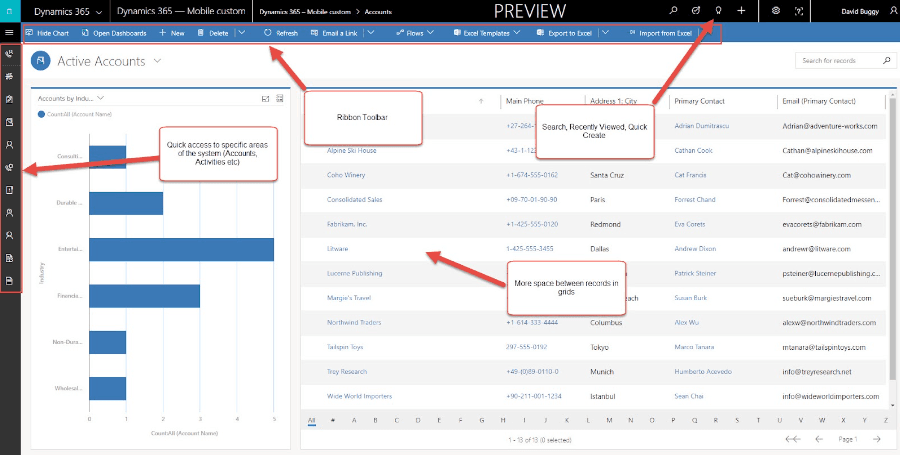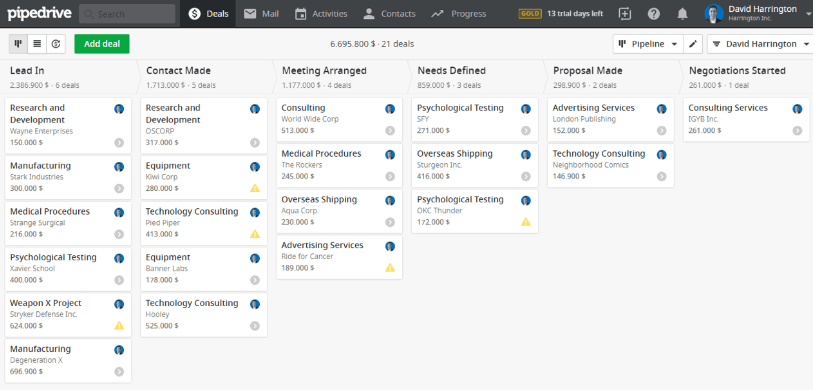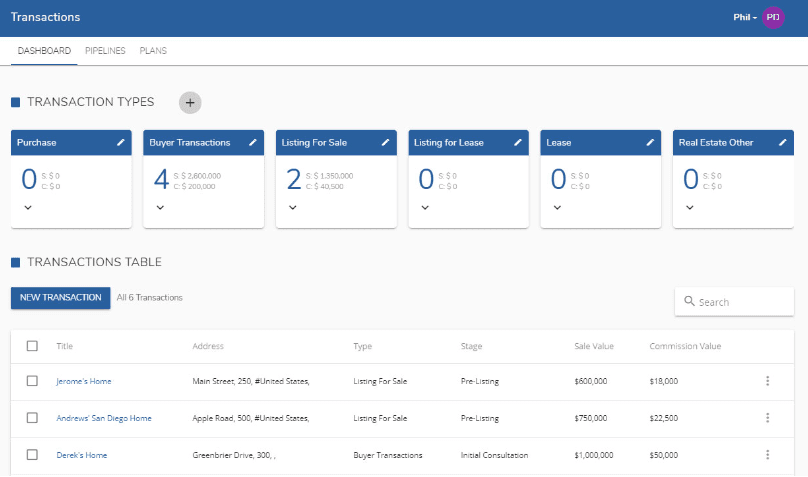What’s the Best CRM in Real Estate in 2024?
Blog

The decision to purchase real estate is typically one of the utmost importance. So when people are property-hunting, they will want to feel that the real estate agent they are working with completely understands their needs, has their best interests at heart, and will be able to fulfill their requirements. For a successful real estate agent, therefore, there is little room for error. They have to painstakingly build trust by working efficiently and being on top of all their information, leaving their clients safe in the knowledge that their requests are in good hands.
For a real estate agent, efficiently managing the data related to clients is therefore extremely vital. A successful realtor has to have complete, detailed information about any given client available on demand. A real estate CRM does precisely this. It provides a unified source of information about any given client and reduces the chances of errors occurring.
What is a CRM in Real Estate?
CRM stands for Customer Relationship Management. In real estate, this broadly means building and maintaining relationships with clients, managing their information, managing appointments, attracting new clients, prioritizing tasks, and of course, closing deals.
Good real estate CRM software provides the tools that enable realtors to carry out these tasks in a way that takes the administrative burden off the realtor. This frees up valuable time for people in an industry that demands that they are always on the go.
The best CRMs for real estate agents provide a unified, readily accessible source of information that helps them focus on cultivating relationships, developing leads, and making sales, all with a data-driven approach.
Benefits of Using a CRM in Real Estate
A good CRM for real estate agents offers several useful benefits. When it comes to organizing information, the best commercial real estate CRMs offer huge advantages over traditional methods like spreadsheets. Realtors can track which clients they’ve had contact with, with rich insights like how far along the purchase journey they are. Real estate agents can respond to inquiries made through various channels from one place, they can manage relationships with past clients to ensure they stay top of mind when it comes to referrals, and they can automate administrative tasks so they can focus on the things that help them grow their portfolio.
In short, good real estate CRM software will help you stay on top of all the activities related to your sales pipeline.
What To Look For in a CRM for Realtors
Does The Real Estate CRM Fit Your Budget and Needs?
Top CRMs for commercial real estate all offer features that are tailored specifically to this industry, and for that specificity, you may be required to pay a premium. However, CRMs that are not specifically targeted at realtors may offer similar functionality at a lower cost. So before investing in a brand new real estate CRM, it is important to have answered a few questions about the capabilities of the software. If you have a small team, for example, you might not need a CRM with advanced capabilities that support distributed teams.
How Easy Is The CRM To Use?
Having a top CRM for commercial real estate won’t do you much good if you and your team can’t get the best out of it because of the complex user interface and steep learning curve. So you want to make sure that, first of all, the CRM you pick has an intuitive user interface and provides a seamless user experience. It should also have plenty of support resources covering the most frequently asked questions and helping you maximize the value you get out of it.
Security and Stability
One of the most attractive features of a CRM is its ability to consolidate all your data into one location. Predictably, security would be one of your top concerns. To start with, you want to keep your data and that of your clients safe from unwelcome access. Secondly, you want to be assured that your painstakingly gathered information, all your clients, prospects, and leads will not suddenly vanish into the virtual ether because a faulty database somewhere packed up. In a notoriously unforgiving industry, a failure of your CRM system could prove fatal to your business.
What Are The Best CRMs For Real Estate?
The market is full of CRMs all claiming to offer something special. Navigating that space can easily become a challenge, so we’ve rounded up a few of the most popular to get your search going.
Microsoft Dynamics 365

Best for: Microsoft Dynamics 365 comes with a range of built-in features perfect for a growing business.
Although Microsoft Dynamics 365 is not specifically designed for the real estate market, it provides more than enough functionality for realtors to make use of. Dynamics 365 has modules to support business functions such as sales, service, and marketing – crucial activities for any real estate company.
Dynamics 365 offers tools to help realtors improve customer engagement, manage relationships with existing clients, and increase their own productivity. It is particularly well-suited to larger firms that might need more enhanced coordination between different teams. For example, from our experience, marketing and sales teams can smoothly exchange data between them, enhancing the efficiency of the organization as a whole.
Pros:
- Microsoft Dynamics 365 makes it easy to collect account receivables from customers.
- Range of adaptability features based on the needs of the customer.
- Microsoft’s powerful Artificial Intelligence helps you to gain more leads and grow your customer base.
- Highly scalable, well-supported, and can be reliably deployed on the cloud or an organization’s server.
Cons:
- The overall cost can go much higher because you have to buy multiple subscriptions to add more features.
- The user interface and the functioning of all the tools are a bit complicated, making it difficult to adapt and implement.
- Designed to be an organizational CRM, so might not be suitable for small businesses.
Price:
- The basic plan starts at $50 per month per user.
- Sales Professional Plan: $65/month/user.
- Sales Enterprise Plan: $95/user/month
- Marketing Professional Plan: $1500/month
- Project Operations Plan: $120/user/month
Salesforce
Best for: Highly customizable CRM with a range of third-party apps and integrations to extend the platform’s functionality based on specific business needs and workflows.
Salesforce is another household name when it comes to CRM software. The platform provides marketing data and social insights about contacts so realtors can identify promising prospects and adapt their messages to them. The fact that it is a cloud-based service provides greater operational freedom as the data is not tied to in-house hardware.
Another one of notable Salesforce benefits offers a free, no-credit-card-required, 30-day trial that allows you to test the platform’s pre-configured processes. You can upload your data or use Salesforce’s pre-uploaded test data, and see the reports and dashboards the platform provides. You also get access to online training and live webinars to get you started.
Pros:
- One of the best-known CRM companies, offering solutions with advanced features like predictive modeling, AI-enabled engagement, automated scoring, and more.
- Salesforce’s email marketing tool comes with ready-to-use templates that are easy to customize.
- The AI high-velocity sales assistance and the automated activity tracker help in performing efficient sales forecasting and lead generation.
Cons:
- Complicated user interface that requires training and expertise – that’s why you may want to consider
- The cost of the Salesforce CRM may get much higher due to the add-ons and integrations
- This makes this CRM comparatively expensive.
Price:
- Sales cloud essentials: $25/user/month
- Sales cloud professional: $75/user/month
- Sales cloud enterprise: $150/user/month
- Sales cloud unlimited: $300/user/month
- Marketing Cloud Pro: $3750/month
HubSpot
Best for: HubSpot is perfect for organizations that need a CMS platform integrated within the CRM.
Although it is not specifically designed for realtors, HubSpot provides most of the tools any company would need from real estate CRM software. The CRM has modules for marketing, sales, customer service, content management, and operations. All of these feature tools that you can use to harvest better insights from your client base, automate repetitive tasks, and close deals.
There are a host of features that come with the free version. If you upgrade to the lowest tier of the paid versions, you also get additional tools for creating content and generating leads, enhancing your communications with leads and customers, connecting with prospects, and tracking performance.
Pros:
- A built-in content management system that integrates well with the CRM.
- 24/7 customer support across all channels.
- Comes with some great features such website grader, content idea generator, marketing planner and buyer persona creator, etc
- Design customized layouts for contacts.
- Free to use, but has paid versions if you want to scale up.
Cons:
- Some of the useful tools and features are only available at the higher plans.
- Google Search Console integration also is only available in the Professional plan.
- Expensive pricing plans when compared with other CRMs.
- Not specific to the real estate market.
Price:
- For Startups, the basic plan ranges between $45 to $89 per month.
- The marketing plan starts at $45 per month
- The sales hub plan starts at $45 per month (for 2 users).
- The CMS hub plan ranges between $23 to $1200 per month.
- The CRM suit starts at $45 per month
- Free trial of 14 days for CMS and operations hub.
PipeDrive

Best for: Best value for money – low-priced CRM with some great features such as visualizing team performance and managing activities.
PipeDrive is another CRM that is not specifically designed for the real estate industry but makes a compelling argument for consideration. The platform is tailored more towards sales than any specific industry. According to the platform’s website, it is a sales CRM and pipeline management software. It, therefore, offers tools that would certainly be useful for real estate teams.
PipeDrive is a web-based CRM software that is suitable for real estate. It is one of the best CRMs for reporting, visualizing team performance, and managing activities. Real estate agents can easily track calls and get contact details of potential customers. PipeDrive simplifies the overall user experience with the help of sales visuals by creating customized pipelines, so you can see exactly where all of your deals are in the sales process.
You can set up a custom chatbot and web forms, and responses from those will be sent to your sales pipeline, you can track communication history with your clients, including calls and emails. You can also integrate the software with a range of other applications such as Zoom, Google services, Slack, and so on.
Pros:
- Contact potential buyers by automating the process of sending property information.
- Transferring the prospects to the next stage of the sales funnel with a single click.
- Easy integration with Gmail and automating the process of adding contacts and task scheduling.
- Native mobile apps on both Android and Apple with a well-designed, intuitive UI.
Cons:
- Dependence on email integration because there is no internal emailing system.
- Not specifically tailored to the real estate market.
Price:
- The basic plan starts at $14.90/user/month
- Advance plan: $24.90/user/month
- Professional plan: $49.90/user/month
- Enterprise plan: $99/user/month
Follow Up Boss
Best for: Communication automation with a wide range of additional tools.
Follow Up Boss is an aptly named platform as its goal is to help you pool all your leads in one place and systematically be able to follow them up. As with one You can import leads from various applications, social networking services, and websites, and then use Follow Up Boss to distribute them among your team members who can then take charge of the follow-up process. In addition to this, Follow Up Boss automates email and text responses to these leads giving your team the responsiveness that is valued by clients. You can also review your clients and leads by viewing smart lists and deciding who to contact and when.
Best commercial real estate CRM? Definitely a contender.
Pros:
- Comes with great built-in tools for follow-ups, text messaging, and email logging tools
- Track customer activity with the help of an integrated IDX that identifies different stages of the customer’s journey and if the customer is interested in buying a property.
- User-friendly interface with a simplified design.
- Specifically designed to be a real estate CRM.
Cons:
- No campaign templates.
- Limited features and functionality on the mobile application.
- Difficult to create custom automation.
- One of the most expensive CRM pricing plans.
Price:
- The Grow plan is $69/user/month.
- The Pro Plan is $416/10 users/month
- The Platform plan is $833/100 users/month
LionDesk

Best for: Real estate brokers looking for a multichannel communication system.
LionDesk is a CRM software that is positioned as being great for all businesses and loved by people in the real estate industry as well. It comes with tools to help you organize contacts, automate communication with clients, customizable reminders, and integrate with different channels for you to run campaigns.
There are also bulk mailing and texting features, and an informative dashboard that lets you see your emails, text, and leads in one place.
Pros:
- Instinctive email marketing that supports file attachments of up to 10MB.
- Create custom templates for different people at different times.
- The transaction management tool helps in building effective and reliable strategies.
- Built-in vigorous data analytics for reporting and insights.
- Has all the tools institutions typically need from the best CRM for real estate.
Cons:
- Lacks email marketing tools, making the campaign-building process a bit difficult and time-consuming.
- Some users have complained about being glitchy.
Price:
- The basic plan starts at $21/month/user
- The Pro+ Plan starts at $42/month/user
- The Elite Plan is $83/month/user
Conclusion
In the real estate business, it is critically important to stay on top of your customer’s needs and to be agile enough to respond to prospects, manage relationships with clients, and stay top-of-mind for referrals. A good CRM should help you to do exactly that. And in a fiercely competitive industry, this could make all the difference. Choosing the best CRM for real estate is therefore a decision that will have a profound impact on your business. We have highlighted some important considerations to make and rounded up some of the best CRMs for realtors that are currently available to help you along in finding the best value for your specific situation.